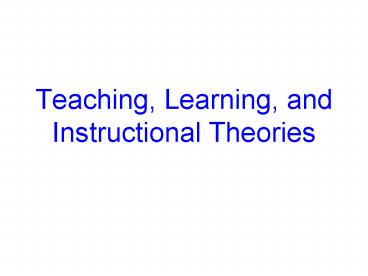Teaching, Learning, and Instructional Theories - PowerPoint PPT Presentation
1 / 19
Title:
Teaching, Learning, and Instructional Theories
Description:
Learning theory: explains how humans learn, learner based. Instructional theory: ways of ... Learn through processes of assimilation and accommodation ... – PowerPoint PPT presentation
Number of Views:806
Avg rating:3.0/5.0
Title: Teaching, Learning, and Instructional Theories
1
Teaching, Learning, and Instructional Theories
2
- Teaching theory ways to teach, teacher based,
often content based - Learning theory explains how humans learn,
learner based - Instructional theory ways of facilitating human
learning and development, learner and instruction
based
3
John B. CarrolModel of School Learning
Degree of learning f(time actually
spent/time needed) 1. Time allowed 2.
Perseverence 3. Aptitude 4. Quality of
instruction 5. Ability to understand the
instruction
4
B.F. Skinner
Theories of Learning
- Positive reinforcement
- Negative reinforcement
- Punishment
5
B.F. Skinner
Model of the Human Memory System
Lost
Lost
Lost
Sensory Register
Long- Term Register
Working(Short-Term)Memory
Input
Attention
Input
Rehearsal Meaningful Learning Organizing Elabora
ting Imagery
6
Jean Piaget
Theories of Cognitive Development in Children
- Sensorimotor stage
- Preoperational stage
- Concrete stage
- Formal operation stage
7
Piagets Basic Assumptions
- Active and motivated learners
- Knowledge becomes more integrated and organized
over time - Learn through processes of assimilation and
accommodation - Development depends on interaction with ones
physical and social environment - Processes of equilibration help to develop
increasingly complex levels of thought - Occurs only after certain genetically controlled
neurological changes occur - Occurs in four qualitatively different stages
8
Jerome Bruner
Learning as Discovery
- Enactive stage
- Iconic stage
- Symbolic stage
9
Bruners Six Benchmarks
- Respond to situations in varied ways, rather then
always in the same way - Internalize event into a storage system that
corresponds to the environment - Have increased capacity for language
- Can interact systematically with a tutor (parent,
teacher, or other role model) - Use language as an instrument for ordering the
environment - Have increasing capacity to deal with multiple
demands
10
Constructivism
- Focus on studentsability to solve real-life,
practical problems - Methods call for students to construct knowledge
themselves - Typically work in cooperative groups
- Tend to focus on projects that require solutions
to problems - Usually time-consuming
- Can be rich learning environments
11
Domains of Learning
- Cognitive
- Affective
- Psychomotor
12
Cognitive
- Knowledge
- Comprehension
- Application
- Analysis
- Synthesis
- Evaluation
13
Affective
- Receiving
- Responding
- Valuing
- Organization
- Characterization of a value complex
14
Psychomotor
- Gross body movement
- Finely coordinated movements
- Nonverbal communication
- Speech behaviors
15
Benjamin Bloom
Uniform Instruction per Learner
Aptitude
Achievement
Optimal Instruction per Learner
Aptitude
Achievement
16
Rotters Locus of Control
- Based on Social Learning Theory
- Measured on a continuum
Internal External
Outcome is contingent upon No perceived
contingency his or her own behavior
between outcome and behavior Low
grade blame self blame teacher High
grade because you are smart because
teacher is excellent
17
Left Brain Right Brain
- Logical
- Sequential
- Rational
- Analytical
- Objective
- Looks at parts
- Random
- Intuitive
- Holistic
- Synthesizing
- Subjective
- Looks at wholes
18
Gagnes Events of Instruction
- Gain attention
- Inform the leaner of the objective
- Stimulate recall of prerequisite learning
- Present new material
- Provide learning guidance
- Elecite performance
- Provide feedback about correctness
- Assess performance
- Enhance retention and recall
19
Gagnes Types of Learning
- Intellectual skills
- Problem solving
- Higher-order rules
- Defined concepts
- Concrete concepts
- Discrimination
- Cognitive strategies
- Verbal information
- Motor skills
- Attitudes































